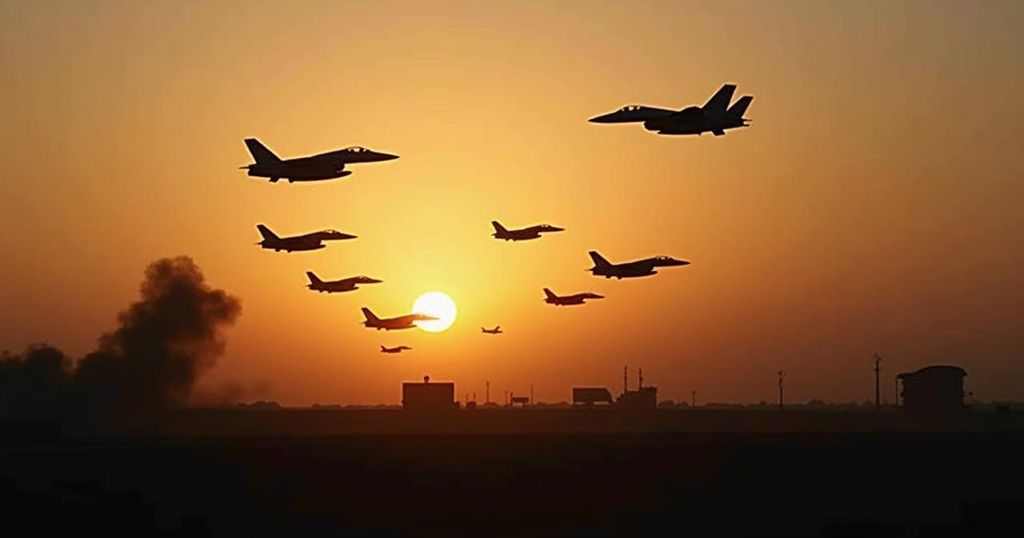Egypt’s airspace is operating normally amid Iran’s missile attacks on Israel, which involved a significant assault involving nearly 200 missiles. The Egyptian Ministry of Civil Aviation assured travelers of operational safety, while regional tensions escalate following retaliatory strikes. The crisis continues to draw international calls for a ceasefire as Israel prepares for a possible response to Iran’s aggressive actions.
CAIRO – 2 October 2024: The Egyptian Ministry of Civil Aviation has confirmed that the nation’s airspace remains secure and operational in the wake of a substantial missile assault by Iran targeting Israel on Tuesday. The ministry has assured travelers that air operations are proceeding under strict safety protocols. In its statement, the ministry noted that, while Egypt’s airspace continues to function normally, there has been coordination with neighboring nations following the closure of airspace by both Jordan and Iran due to these regional developments. Notably, an EgyptAir flight destined for Amman was redirected back to Cairo International Airport as a result of Jordan’s airspace restrictions. The airline, alongside the public relations teams at Cairo International, has expressed its commitment to assisting affected passengers. As a precautionary measure, Cairo International Airport has enhanced its security protocols in anticipation of possible flights redirected from neighboring closed airspaces. Travelers scheduled to fly to Baghdad, Erbil, or Jordan have been advised to verify their flight arrangements, with the ministry promising to provide ongoing updates regarding the evolving situation. Iran executed a massive military campaign on Tuesday, launching approximately 200 missiles at Israeli military installations, marking its most significant offensive in history against Israel. This attack was reportedly in response to prior Israeli strikes that resulted in the deaths of Iranian and Hezbollah leaders. The ongoing violence has escalated, with nearly 1,900 casualties reported from cross-border confrontations since the outbreak of conflict in Gaza last October. Amidst these tensions, there have been widespread calls, including from Egypt and the United Nations, for a ceasefire to alleviate the humanitarian crisis in Gaza, which has seen over 41,600 Palestinian fatalities. However, Israel continues its military engagement across the region, reflecting the severity of the conflict. In response to Iran’s missile strikes, Israeli officials have pledged a strong retaliatory action, with Prime Minister Benjamin Netanyahu and UN Ambassador Danny Danon both asserting that Iran will face significant consequences for its aggression. Furthermore, the White House has indicated a willingness to collaborate with Israel to address Iran’s actions decisively. The Iranian military, proclaiming a successful launch of hypersonic missiles during this assault, has warned of escalated retaliation should Israel provoke further conflict.
The recent Iranian missile attacks on Israel are part of a prolonged cycle of violence in the region that has intensified since the start of the Israeli war in Gaza in October 2023. This cycle has resulted in significant casualties and geopolitical instability. Egypt, historically a mediator in Middle Eastern conflicts, continues to maintain its airspace and assist travelers amid these tensions. Understanding the regional dynamics, including the responses from various nations and military alliances, is crucial for comprehending the current situation and its potential implications.
The Egyptian airspace remains secure and operational despite recent hostilities initiated by Iran against Israel, which resulted in significant missile strikes. Egypt has assured travelers of safe operations and remains vigilant amid escalating tensions in the region. While there are appeals for a ceasefire and de-escalation, ongoing military actions by various parties continue to threaten stability in the Middle East. The international community, including the United Nations and the United States, is closely monitoring the situation, underscoring the need for diplomatic resolutions.
Original Source: www.egypttoday.com







